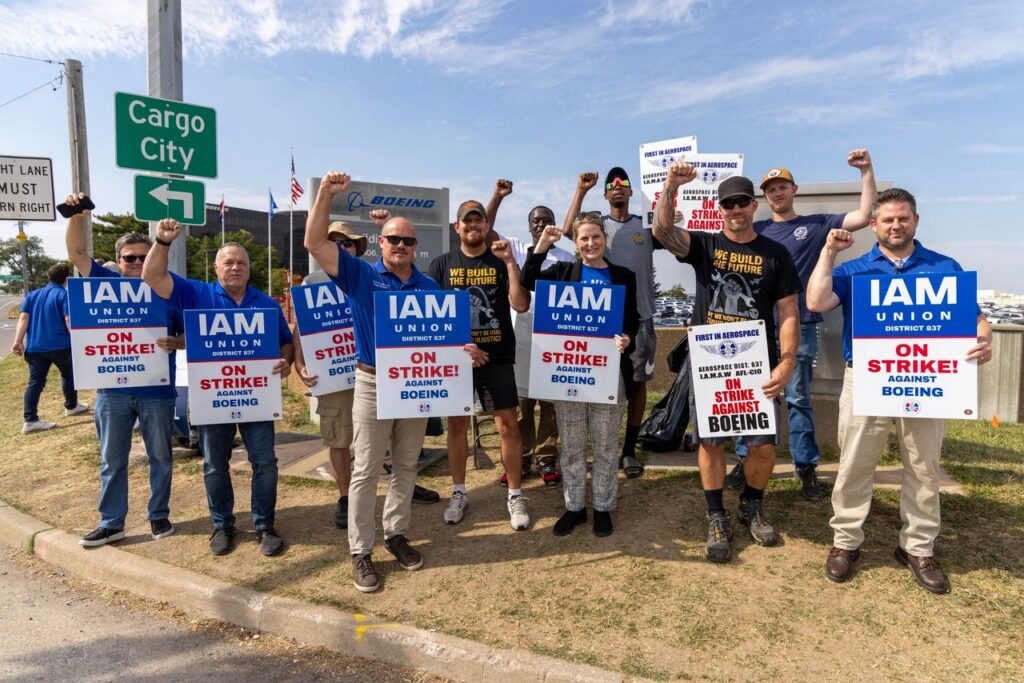Read this article in:
English
- Español
21 November, 2025Workers at IAM District 837 in St. Louis, USA, have ratified a new five-year agreement with Boeing, ending a nearly 15-week strike that drew national attention, not only for its duration, but for the unusual bipartisan support it received in one of the more conservative states in the United States.
While the settlement includes wage increases totalling 24 per cent over the life of the contract, reflecting the increasingly competitive labour market for skilled aerospace workers, the significance of this dispute extends far beyond the specific terms. It is part of a broader global trend: as the aerospace sector faces severe labour shortages, rising production pressure and renewed scrutiny over safety and quality, workers across multiple countries are organizing, striking, and winning.
The St. Louis strike follows major aerospace disputes in the United States, Canada, Europe and the UK over the past two years. Across the supply chain, from aircraft assembly to components, engines, defence systems and Maintenance, Repair and Overhaul (MRO), companies are struggling to attract and retain skilled labour.
In particular, this deal comes only a year after the major Seattle-area walkout, when 33,000 workers at Boeing’s commercial aviation operations struck in protest of low wage growth and concessions. That strike set a precedent, and the St. Louis contract builds on that momentum.
The shortages that the industry is facing seem to be strengthening workers’ bargaining power worldwide, particularly in high-skill environments where production bottlenecks have immediate consequences for delivery schedules, military contracts and regulatory credibility.
In St. Louis, Boeing threatened to hire permanent replacement workers. But the company was already struggling to recruit and retain skilled labour before the strike, a reality mirrored across the global industry, making the threat ineffective and ultimately reinforcing the union’s leverage.
The strike also stood out politically. Workers received public backing from both Democratic and Republican elected officials, a rare show of cross-party solidarity in the United States, and even more unusual in Missouri, one of the more conservative states in the country.
For the global labour movement, this signals a broader shift: aerospace workers are gaining increasing recognition for the critical role they play in national industrial capacity, economic security and defence supply chains.
A win rooted in unity
IAM District 837 members maintained extraordinary unity over nearly 15 weeks, despite intense pressure. Their determination led to improvements in wage progression, a higher signing bonus than Boeing first proposed and the preservation of a strong retirement plan with a company contribution of up to 8 per cent.
But beyond the numbers, the strike made it clear that when workers stand together, they can significantly influence negotiations, even with some of the world’s largest industrial employers.
Quote from Georg Leutert, IndustriALL Global Union Aerospace Director said:
“The strength shown by IAM District 837 sends a clear message across the global aerospace industry: workers are not only essential, they are powerful. We are seeing the same pattern. As companies struggle to recruit and retain skilled labour, workers are organizing, taking action and winning. This strike demonstrates the power of unity at a moment when the industry is under enormous pressure to deliver safely, on time and with quality. IndustriALL stands in full solidarity with the IAM, and with aerospace workers everywhere who are fighting for decent work, respect, and a fair share of the value they create.”




